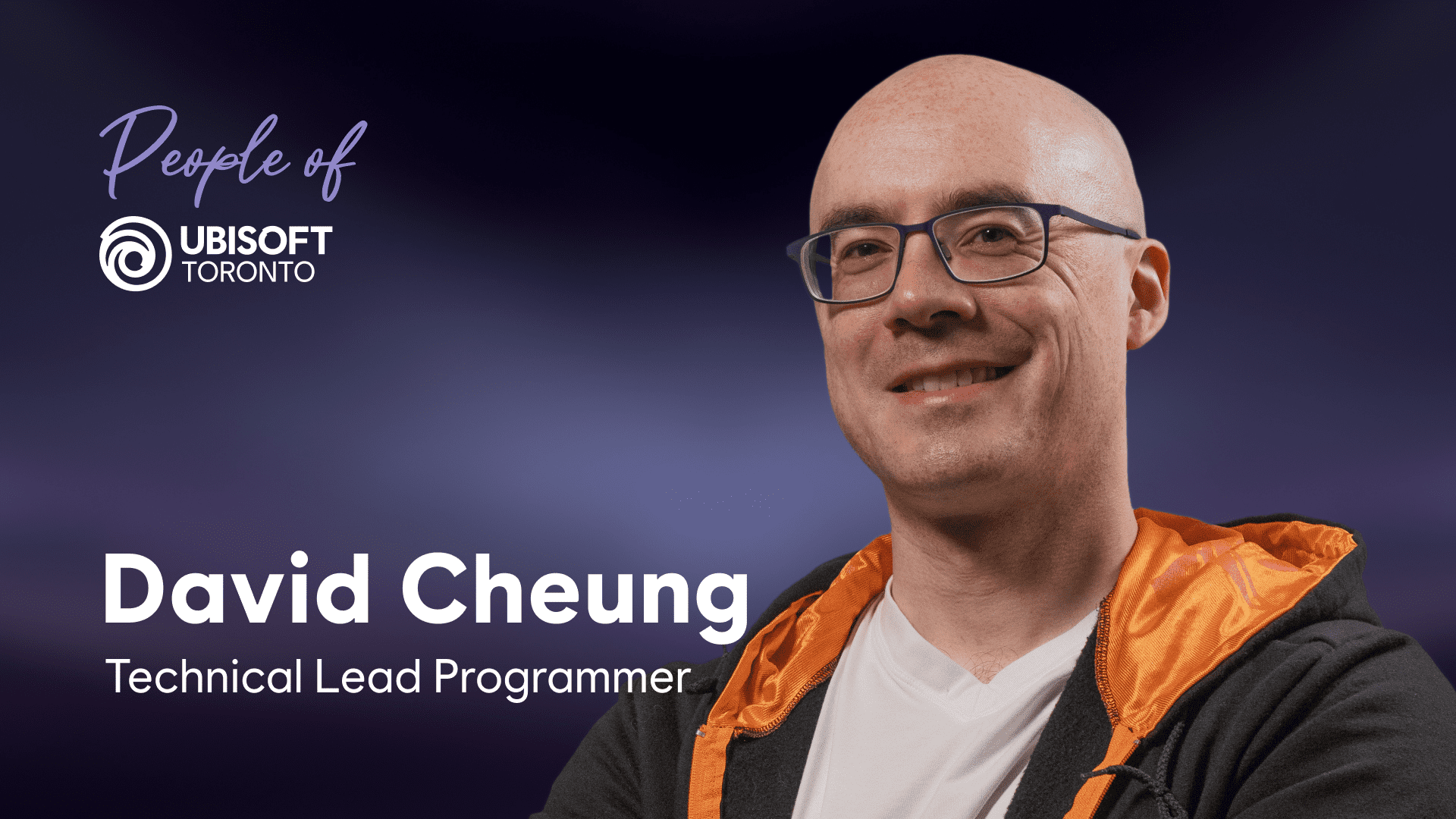Printouts of MapQuest directions to get to his first interview and early projects written in C kicked off an exciting 22-year programming journey for David Cheung, a decade of which he spent as a part of Ubisoft Toronto! David is currently a Technical Lead Programmer on the Splinter Cell remake and has worked on multiple AAA titles including Far Cry 6, Starlink: Battle for Atlas and Splinter Cell Blacklist. Read on to learn about his career journey, his “sweet” aspirations, and insight into the huge team endeavour behind the Far Cry 6 expansion Lost Between Worlds!
FAR CRY 6: LOST BETWEEN WORLDS

Hey David! You worked on the Far Cry 6: Lost Between Worlds expansion — can you shed some light on you and your team’s process behind the work and what was the result?
I worked on the “Comandante Fai” and “Death by Darkness” Rifts for the Lost Between Worlds expansion. Part of the challenge was reimagining systems Far Cry 6 players are familiar with and transforming them into something brand new. For example, the “Comandante Fai” was based on the fantastic work the Kyiv team did for the Photo Mode, where Dani deploys bombs on the enemies while time is paused by Fai. And the “Death by Darkness” rift — where Dani can only survive by stopping the sun from setting — takes the work that the Art team did for the day/night cycles and pushes it to its technical limits.
Some of the first things we did were figuring out if the tech was even possible – can we pause the entire game, but still fly a camera around and place traps for the enemies, then resume and watch the scenario unfold? Can we constantly rewind and fast-forward the time of day without the lighting breaking down? Part of that was one of the level designers, Chris Conway, going off to prove out the game mechanics with our scripting language (shoutout to “SetEnvironmentTimeScale( )”), while I worked on a long-term code solution to dynamically alter the time of day. Then another level designer, Chris Sinclair, put both things together to get the final product.
What about working on this expansion has you fired up?
I can’t wait to see what players think of all the new play styles for the different Rifts. I’m also excited to see what they think of the fantastic new characters and environments – it’s all so different from what came before, and it was amazing to see them take shape over the course of this project.
CAREER DEVELOPMENT
What did you do before working at Ubisoft Toronto? How’d you break into the video game industry?
Before Ubisoft Toronto, I worked at a couple of other videogame studios – Drinkbox Studios and Silicon Knights. That’s where I started my career working on Nintendo GameCube games such as Eternal Darkness and Metal Gear Solid: Twin Snakes. I broke into the industry by seeing a job listing in the classified section of a newspaper and driving to the interview with a stack of printed-out directions from MapQuest. I think my enthusiasm for games, as well as the samples of a couple of projects I’d written in C (a small RPG and a pixel art editor), got me the job!
What are some tips you’d give to someone hoping to land a similar role to yours?
You don’t have to know everything about everything, but be a little familiar with as much as you can. Also, be curious! Ask yourself questions about everything – if something doesn’t work, why doesn’t it work? Can we do something better than we do now?
I like to think that if I’ve been successful, it has been because I consider the end user of what I’m working on. That’s usually the people who play our games, but it also includes all the talented content creators I work with. I think about how I can remove the barriers to what they’re working on, so they focus on what they do best – the creative process. That’s partly having a lot of experience in the game industry, but also more importantly, talking with the rest of the team about what challenges they’re having, or even just sitting down with them to watch their process.

Can you describe a project you’ve worked on that you’re proudest of?
Starlink: Battle for Atlas was a brand-new IP with an innovative, modular, “toys-to-life” design, running on the Snowdrop engine.
From the start we were a very small (but incredibly talented!) team, and we had to come up with clever solutions to some very complicated problems, like dealing with sheer size of space, generating and populating these massive planets (while still making them traversable), and creating the actual physical toys and electronics hardware.
In the end, everyone had to become an expert at a lot of different things! One of my favorite memories were the weeks leading up to the reveal of Nintendo’s Starfox characters being in the Switch version, hoping we could keep this huge surprise, and finally being able to show the world everything at E3 2018!
CURRENT PROJECTS
You’re currently Technical Lead Programmer on the Splinter Cell remake. Tell us a little more about what you do?
As a Technical Lead Programmer, I work with my team to produce high-quality gameplay code related to the 3Cs (Character, Camera & Controls) and any gameplay systems. This can take the form of providing direction and assistance to the team, or designing and validating the high-level systems to be broken down into tasks with the Gameplay Team Lead and production.
As the project progresses, I’ll be shifting more towards writing code myself, as well as continuing to support the team with their own tasks through feedback and mentorship. As a Lead, my favourite part of the role is having a direct impact on the design of systems, as well as being able to work with my team to tackle problems.
LIFE AT UBISOFT TORONTO
What drew you to Ubisoft Toronto?
I grew up in Toronto but moved away for work, so when I heard there was an opening to work on Splinter Cell Blacklist back in the city, I jumped at the chance! Up until that point, I’d worked on quite a few games, but I was always curious what it would be like to work on a big AAA title like Splinter Cell or Far Cry. I have to say it’s definitely lived up to expectations!
What surprised you most when you joined?
It sounds strange to say now, but before I joined Ubisoft Toronto, I didn’t realize just how much collaboration goes into making a game with a really big team. So, what surprised me about Ubisoft Toronto was how professional everyone was — not just in terms of attitude, but how every aspect of production was accounted for.
If a new feature went into the game, we knew who was going to work on it, and for how long, and all the dependencies. If anything changed, there was a good justification behind it, and it was explained to the team. The other thing that struck me was just how talented everyone was. There are truly experts in every field at the studio, and so much to learn all the time!
BONUS

What do you do to relax?
Like a lot of people in the last couple of years, I took up baking! So now one of my life goals is to get on “Nailed It!” and have Nicole Byer go “Oh ho ho! Oh nooo!” when she tries something I’ve baked badly and covered up with dusty modeling chocolate and gummy worms.
People of Ubisoft Toronto is a series featuring studio members from a variety of projects and backgrounds as they share their experiences at our studio, perspective of the video game industry and, perhaps, even a sneak peek of what they’re working on! ;)
Our studio values diversity and believes in embracing differences to build stronger and more creative teams. We welcome people who would like to join us and redefine the future of games. Visit our careers page for more information on open roles and how to apply. To know more about our studio members and culture, click here.

Read more:
- People of Ubisoft Toronto — Meet Matt West, Producer
- People of Ubisoft Toronto — Meet Eduardo Vaisman, Audio Director
- GDC 2022: Ubisoft Toronto Experts Share Insights and Technical Innovation Behind Far Cry 6
